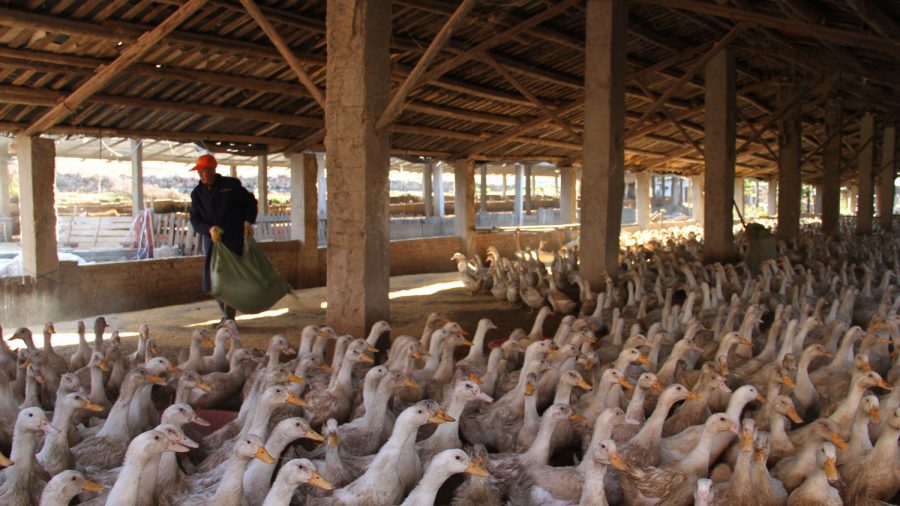Local Chinese authorities have arbitrarily detained a Chinese tycoon and seized his company, valued at 10 billion yuan ($1.49 billion), as revealed in a recent exposé by China Times.
The partially state-run China Times first reported on the scheme on March 29, but its reports were soon removed by internet censors. Other Chinese media that had been covering the case eventually deleted their reports. However, some overseas Chinese media have reposted the articles.
The case is indicative of a recent phenomenon in the Chinese economy in which local governments have intimidated the private sector with heavy-handed tactics.
An Entrepreneur Detained
As the richest man in Dezhou City of eastern China’s Shandong Province for several years running, Zhang Hongbo had become a famous entrepreneur in China. He was one of the torchbearers during the Beijing Olympics in 2008. He also accompanied the Chinese Communist Party (CCP) leaders during a visit to Europe in 2014.
In April 1998, he invested 135 million yuan ($20.11 million) to create Zhong’Ao, a meat company specializing in breeding and raising ducks, producing duck feed, butchering the birds, and processing the meat.
Before he was suddenly detained in 2017, Zhang owned 99.98 percent of the company’s shares, with his firm valued at more than 10 billion yuan ($1.49 billion), according to China Times.
The most valuable assets of the company were export licenses to the European Union. To receive these licenses, Zhong’Ao invested in high-quality production lines and strict food safety standards. By the end of 2017, Chinese firms owned 37 EU poultry meat export licenses, of which Zhong’Ao owned two, according to Chinese media reports.
On the evening of June 4, 2017, Zhang received a phone call from the mayor of Qingyun County, who told him the local Party boss Zhang Xiaodong would like to meet with Zhang to discuss possible cooperation between Zhong’Ao and the state-run China National Cereals, Oils and Foodstuffs Corporation.
When Zhang arrived at around 10 p.m., several plainclothes police were waiting for him there and detained him without due process, China Times reported.
The next day, police forced Zhang to sign a bankruptcy filing document for Zhong’Ao. Then, police sent a notice to Zhang’s family that he was charged with “running an illegal operation,” according to local media.
On the third day, the Qingyun court filed an immediate verdict that Zhong’Ao had gone bankrupt and appointed Shandong Huaxin, a Rizhao City-based trading company, to deal with the bankruptcy process.
According to China’s bankruptcy laws, a company must apply for bankruptcy in court, after which the court and local government will co-organize a liquidation team within 15 days, which includes officials from different departments, lawyers, and accountants.
China Times reported that in Shandong Province, courts can appoint a local company as bankruptcy agents to handle the process, but this company must be based in the same city as the bankrupt company and must be approved by officials.
The case of Zhong’Ao did not follow local laws.
Zhang’s parents have repeatedly asked police to release Zhang in the past 21 months, but all their efforts were in vain. Zhang’s charges were also repeatedly changed. No court hearing was ever arranged.

Forced Bankruptcy
Zhong’Ao was deemed bankrupt by the local court and became under the control of Qingyun county government and Huaxin on June 5, 2017.
China News reported that the local government intended to use this “bankruptcy” method in order to seize the company’s lands for real estate development.
EU export licenses are very valuable. But the Qingyun County government cannot arbitrarily close Zhong’Ao’s production lines.
So the government arranged for Zhong’Ao to file for bankruptcy. In 2018, Qingyun Xingye, an assets management company, bought partial stakes in Zhong’Ao, but did not register ownership change within 15 days as required by Chinese customs. So the EU licenses were revoked.
After losing the EU licenses, Zhong’Ao was forced to close down its production lines. The county government then arranged to sell the company’s land.
Sale of Company Land
Zhong’Ao had 5,000 mu (about 824 acres) of land within the city center of Qingyun County when Zhang was detained. The land is for industrial use.
In the middle of January 2019, over 3,000 mu (448 acres) of them went on sale, as well as 180,000 square meters (1.9 million square feet) of buildings on them.
The partially state-run China News reported that Qingrong Funding Company bought all the land, at a price far lower than when Zhong’Ao purchased it.
‘Guo Jin Min Tui’
From around 2010, a new phrase was coined in China: “Guo Jin Min Tui,” which means “the state-owned enterprises advance, while the private sector retreats.” It means the government uses policies to limit the private sector’s development and instead push for state-owned firms.
Most recently, during this year’s “Lianghui” political meetings in Beijing, one particular official brought up the issue.
Sun Qian, the deputy prosecutor general of the Supreme Procuratorate, the highest national level agency responsible for both prosecution and investigation in China, said on March 4: “The bosses of some individual private businesses were detained by police once they were suspected of a crime. From the perspective of the judiciary, we should not detain people and close down businesses haphazardly.”
From The Epoch Times

